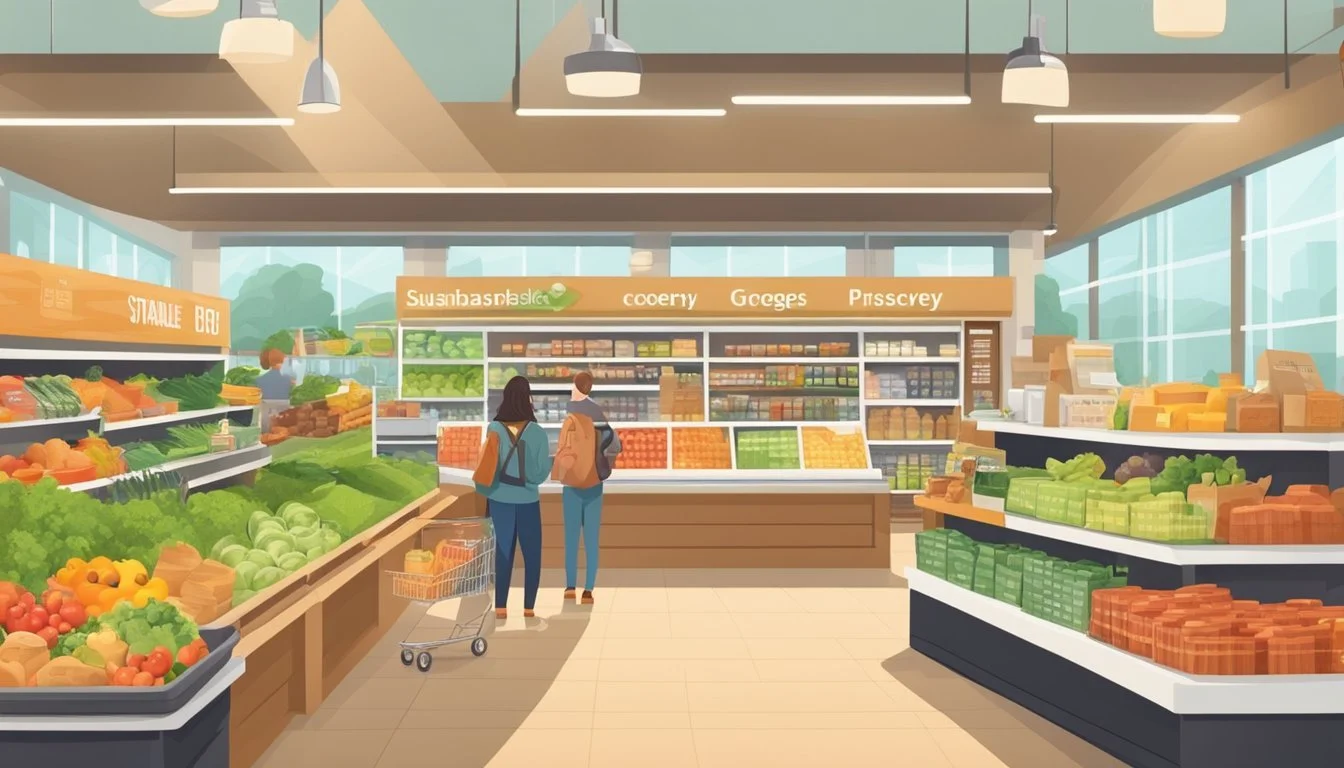Albertsons vs FoodMaxx
A Comprehensive Comparison of Prices, Quality, and Selection
When it comes to grocery shopping, choosing the right store can significantly impact your budget and overall experience. Albertsons and FoodMaxx are two popular options that cater to different consumer needs.
FoodMaxx offers prices up to 21% lower than the average grocery store, while Albertsons tends to have higher prices but may provide a wider selection of products. This price difference can translate to substantial savings for families who spend around $250 per week on groceries.
Both stores have their strengths and weaknesses. FoodMaxx appeals to budget-conscious shoppers with its competitive pricing, while Albertsons may attract customers looking for a more diverse range of products or a different shopping atmosphere. The choice between these two grocery chains ultimately depends on individual preferences and priorities.
Company Profiles
Albertsons and FoodMaxx operate distinct business models in the competitive grocery retail landscape. Albertsons boasts a widespread presence across the United States, while FoodMaxx focuses on a no-frills approach in specific regions.
Albertsons' Market Presence
Albertsons is one of the largest food and drug retailers in the United States. The company operates over 2,200 stores across 34 states and the District of Columbia. Albertsons owns several well-known grocery chains, including Safeway, Vons, and Jewel-Osco.
In 2015, Albertsons merged with Safeway, significantly expanding its market reach. This merger created a powerful entity in the grocery industry, combining Albertsons' strong presence in the Midwest and South with Safeway's dominance on the West Coast.
Albertsons offers a wide range of products, from fresh produce to prepared meals and household items. The company also provides pharmacy services in many of its locations.
FoodMaxx's Business Model
FoodMaxx operates as a discount grocery chain, primarily serving communities in Northern California and Nevada. It is a subsidiary of The Save Mart Companies, which also owns Save Mart and Lucky supermarkets.
FoodMaxx employs a warehouse-style format, focusing on providing low prices to budget-conscious shoppers. The stores typically feature a no-frills layout with products displayed in their original shipping boxes to reduce overhead costs.
This cost-saving approach allows FoodMaxx to offer competitive prices on a variety of grocery items. The chain emphasizes bulk purchases and deals on everyday essentials. While FoodMaxx may not offer the same extensive selection as larger supermarkets, it provides a more affordable shopping experience for many customers.
Geographical Reach and Store Locations
Albertsons and FoodMaxx have distinct geographical footprints across the United States. Their store locations reflect different regional strategies and market presences.
Albertsons' Locations
Albertsons operates over 2,200 stores across 34 states and the District of Columbia. The company has a strong presence in the western and southern United States.
Major markets include California, Washington, Oregon, Idaho, and Texas. Albertsons also maintains stores in the Midwest and along the East Coast.
The chain's reach extends to both urban and suburban areas. Albertsons targets diverse demographics with its various store formats and banners.
FoodMaxx's Store Footprint
FoodMaxx, a discount grocery chain, has a more limited geographical presence compared to Albertsons. The company primarily operates in California's Central Valley and Bay Area.
FoodMaxx has approximately 50 stores across northern and central California. Key markets include Sacramento, Fresno, and San Jose.
The chain focuses on serving price-conscious shoppers in these regions. FoodMaxx stores are typically located in areas with high population density and competitive grocery markets.
FoodMaxx's concentrated footprint allows for efficient supply chain management and targeted marketing efforts in its core markets.
Price Comparison and Affordability
Albertsons and FoodMaxx offer different pricing strategies and savings opportunities. FoodMaxx generally provides lower everyday prices, while Albertsons focuses on promotional discounts and loyalty programs.
Everyday Prices at Albertsons and FoodMaxx
FoodMaxx consistently offers lower everyday prices compared to Albertsons. On average, FoodMaxx prices are 21% below the all-store average in the Bay Area. This translates to significant savings for shoppers.
A family spending $250 per week on groceries could save around $52.50 by choosing FoodMaxx over higher-priced competitors. Albertsons' regular prices tend to be higher, though they vary by location and product category.
FoodMaxx achieves its low prices through a no-frills shopping experience and focus on store brands. Albertsons maintains higher everyday prices but compensates with frequent sales and promotions.
Discounts and Savings Opportunities
Albertsons offers more robust discount programs and promotional offers. Their Just for U loyalty program provides personalized deals and digital coupons. Shoppers can stack these savings with manufacturer coupons for deeper discounts.
Weekly ad specials at Albertsons often feature significant markdowns on select items. The chain also runs frequent "buy one, get one free" promotions.
FoodMaxx relies less on promotional pricing. They maintain consistently low prices across their inventory. However, FoodMaxx does offer some weekly specials and seasonal discounts.
Both stores provide savings opportunities, but through different approaches. Albertsons rewards strategic shopping and deal-hunting, while FoodMaxx appeals to customers seeking straightforward low prices without the need to track sales or clip coupons.
Product Selection and Quality
Albertsons and FoodMaxx differ in their product offerings and quality standards. Both stores aim to meet customer needs, but take distinct approaches to selection and sourcing.
Produce and Meat Quality
Albertsons emphasizes high-quality fresh produce and meats. Their produce departments feature a wide variety of fruits and vegetables, often including local and seasonal options. The chain partners with regional farmers to ensure freshness.
Albertsons' meat counters offer USDA Choice and Prime beef cuts. Shoppers can find fresh chicken, pork, and turkey. The stores frequently have butchers on-site to provide custom cuts and advice.
FoodMaxx focuses on value, offering a more limited but budget-friendly produce selection. While the quality may be less consistent, prices are typically lower. Their meat department provides standard cuts at competitive prices.
Organic and Specialty Products
Albertsons carries a substantial organic product line, including fresh produce, meats, and packaged goods. Their O Organics brand covers many staple items. The stores also stock specialty and gourmet products for more diverse shopping needs.
FoodMaxx has a smaller organic selection, mainly focusing on popular items like organic milk or eggs. Their specialty product offerings are limited, catering more to everyday essentials rather than gourmet or niche items.
Albertsons typically provides a broader range of brands and unique products. FoodMaxx concentrates on offering the most common items at lower prices, with fewer premium or specialty options available to shoppers.
Branding and Store Experience
Albertsons and FoodMaxx utilize distinct branding strategies and store experiences to attract and retain customers. Their approaches to private labels, store atmosphere, and customer service shape how shoppers perceive and interact with each chain.
Private Labels and Exclusive Products
Albertsons offers a range of store brands, including Signature Select and O Organics. These private labels cover various product categories, from pantry staples to fresh produce. FoodMaxx, on the other hand, focuses on providing a no-frills shopping experience with fewer private label options.
Albertsons' store brands often emphasize quality and value, appealing to families seeking affordable yet reliable products. FoodMaxx prioritizes low prices across its product selection, including both national and lesser-known brands.
Shopping Environment and Customer Service
Albertsons stores typically feature a more polished atmosphere with wider aisles and brighter lighting. The supermarket chain invests in creating a welcoming environment for customers. FoodMaxx adopts a warehouse-style layout, emphasizing efficiency and cost-savings.
Customer service at Albertsons tends to be more personalized, with dedicated checkout lanes and staff available to assist shoppers. FoodMaxx operates with a leaner workforce, focusing on keeping prices low. This approach appeals to budget-conscious customers who prioritize savings over extensive services.
Albertsons has cultivated a loyal following among families and shoppers who value a traditional grocery store experience. FoodMaxx attracts price-sensitive customers looking for significant savings on their grocery bills.
Customer Centric Services
Albertsons and FoodMaxx employ various strategies to enhance customer experience and loyalty. These include personalized rewards programs and convenient shopping options designed to meet evolving consumer needs.
Loyalty Programs and Customer Rewards
Albertsons offers the Just for U loyalty program, providing personalized digital coupons and special deals. Members earn points on purchases, redeemable for discounts on groceries and gas. The program integrates with the Albertsons mobile app, allowing easy access to savings and digital receipts.
FoodMaxx takes a different approach, focusing on everyday low prices rather than a traditional loyalty program. They offer digital coupons through their website and mobile app, but without a points-based system. This strategy aims to attract price-conscious shoppers who prefer straightforward savings without membership requirements.
Both stores' approaches cater to different customer preferences, with Albertsons fostering a loyal following through personalized rewards and FoodMaxx appealing to bargain hunters with consistent low pricing.
Grocery Delivery and E-Commerce
Albertsons provides robust e-commerce options, including home delivery and curbside pickup services. Their online platform offers a wide selection of products, weekly ad specials, and the ability to create shopping lists. Delivery is available in many areas, with pricing and membership options similar to Amazon Prime's grocery service.
FoodMaxx's e-commerce offerings are more limited. They provide online shopping with in-store pickup at select locations. Their website allows customers to browse weekly ads and create shopping lists. However, FoodMaxx does not currently offer home delivery services in most areas.
Albertsons' comprehensive online shopping experience caters to customers seeking convenience, while FoodMaxx's more basic e-commerce options align with their focus on in-store value shopping.
Sustainability and Ethical Practices
Albertsons and FoodMaxx have different approaches to sustainability and ethical practices. Their strategies impact sourcing, environmental initiatives, health considerations, and animal welfare.
Sourcing and Environmental Impact
Albertsons emphasizes sustainability through its Recipe for Change initiative. The company focuses on supply chain improvements and circularity efforts. Albertsons has expanded its organic produce offerings and works to reduce packaging waste.
FoodMaxx, as a discount grocer, has less publicly available information on sustainability practices. The store aims to keep prices low, which can sometimes conflict with costlier sustainable sourcing methods.
Both chains have taken steps to reduce plastic bag usage, though Albertsons has been more proactive in this area. Albertsons also invests in energy-efficient store designs and equipment to lower its environmental footprint.
Health and Animal Welfare
Albertsons offers a wider selection of organic and health-focused products compared to FoodMaxx. The chain carries grass-fed meat options and has committed to improving animal welfare standards for its private label brands.
FoodMaxx provides some organic choices but focuses more on conventional products to maintain lower prices. The store offers a limited selection of grass-fed meats and free-range eggs.
Albertsons has pledged to eliminate the use of antibiotics and growth hormones in its private label fresh chicken, turkey, and pork products. FoodMaxx does not have similar public commitments regarding antibiotic use in its meat supply chain.
Conclusion
Albertsons and FoodMaxx each have their strengths as grocery stores. FoodMaxx generally offers lower prices on many items, making it appealing for budget-conscious shoppers. Their no-frills approach allows them to pass savings on to customers.
Albertsons, while often pricier, provides a wider selection of products and brands. They tend to have more locations, increasing convenience for many consumers. Albertsons also typically offers a higher-end shopping experience.
Product quality can vary between the two chains. Albertsons may have an edge in fresh produce and meats, while FoodMaxx focuses on providing basic staples at competitive prices.
The best choice ultimately depends on individual priorities. Those seeking rock-bottom prices may prefer FoodMaxx. Shoppers who value variety and are willing to pay more could lean towards Albertsons.
Location plays a key role as well. Consumers should consider which store is more accessible in their area. Both chains aim to meet different customer needs in the grocery market.








